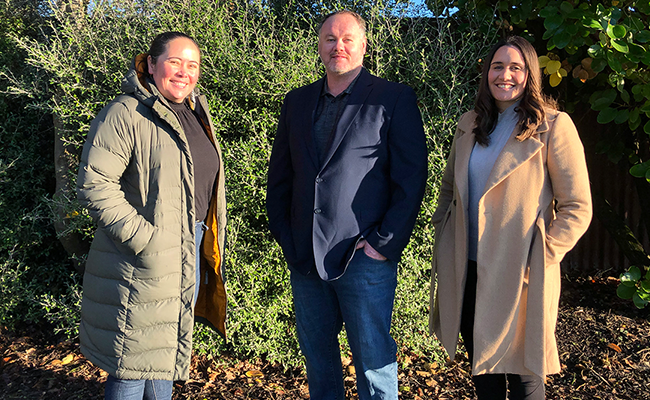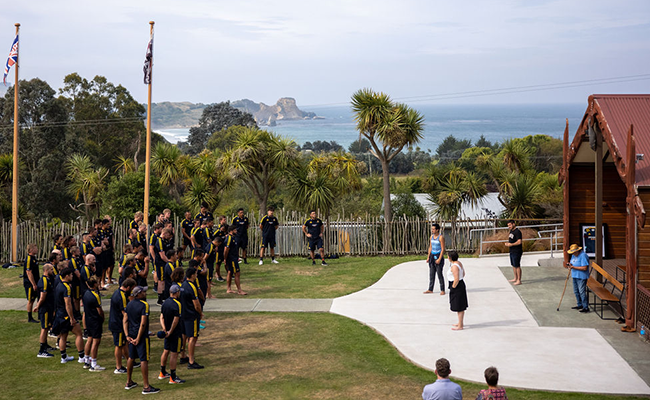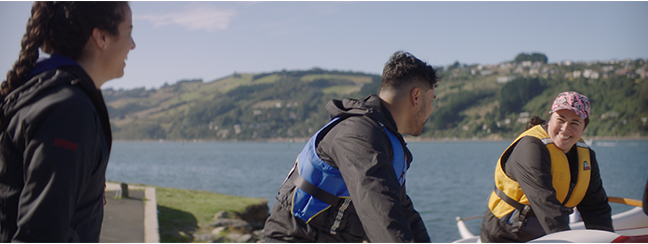Thursday 23 June 2022 3:57pm
 Associate Professor Anne-Marie Jackson (left), strategic development lead for the Centre of Indigenous Science , and co-Directors of Te Koronga, Dr Jeremy Hapeta (centre), and Dr Chanel Phillips (right) who was also Te Koronga’s first doctoral graduate.
Associate Professor Anne-Marie Jackson (left), strategic development lead for the Centre of Indigenous Science , and co-Directors of Te Koronga, Dr Jeremy Hapeta (centre), and Dr Chanel Phillips (right) who was also Te Koronga’s first doctoral graduate.
The rise of Matariki brings with it the launch of a new Centre of Indigenous Science at the University of Otago.
Māori academic Associate Professor Anne-Marie Jackson (Ngāti Whātua, Ngāpuhi, Ngāti Kahu o Whangaroa, Ngāti Wai) is leading the strategic development of the teaching and research aspirations of the Centre over the next six months before it formally starts on 1 January, 2023.
“The Centre of Indigenous Science will be one of the first of its kind in Aotearoa, so this is an opportunity to continue to grow an academic department and scholarship based on ngā kaupapa Māori in sciences,” Associate Professor Jackson says.
“We will take this time to reach out to our whānau, hapū, iwi, to our communities and networks and bring together the philosophical understanding and underpinnings of Indigenous Science.”
Professor Richard Barker, the Pro-Vice-Chancellor of the Division of Sciences where the new Centre will be located, says the new Centre creates a launching pad for the development of a new and innovative programme.
“As one of the first of its kind in Indigenous Science, the Centre’s time has come,” Professor Barker says. “This is a great opportunity to carve out this new space, and we are excited to see the Centre develop a highly attractive and valuable programme.
“In developing our understanding of the natural world and our explanations, all knowledge has value and legitimacy. An indigenous perspective also has value in that it is different, and the advancement of knowledge typically occurs when new perspectives are brought to a problem.”
 Haka “Hautoa Kia Toa” performed in public for the first time at Puketeraki Marae in 2021. The haka was written for the Highlanders by Waiariki Parata-Taiapa with support from Te Koronga Associate Professor Anne-Marie Jackson and Te Koronga Kaitiaki Kaupapa Mr Danny Poa who are in this photo fine tuning the haka. Te Koronga has worked with the Highlanders supporting player hauora. Dr Jeremy Hapeta leads this mahi and will continue to do so in the new Centre.
Haka “Hautoa Kia Toa” performed in public for the first time at Puketeraki Marae in 2021. The haka was written for the Highlanders by Waiariki Parata-Taiapa with support from Te Koronga Associate Professor Anne-Marie Jackson and Te Koronga Kaitiaki Kaupapa Mr Danny Poa who are in this photo fine tuning the haka. Te Koronga has worked with the Highlanders supporting player hauora. Dr Jeremy Hapeta leads this mahi and will continue to do so in the new Centre.
Professor Jacinta Ruru (Raukawa, Ngāti Ranginui, Ngāti Maniapoto), former co-Director of Ngā Pae o te Māramatanga and Professor of Law at the University of Otago, says the creation of this centre is an incredible testament to the vision and leadership of Associate Professor Anne-Marie Jackson and all who work with and inspire her every day; past, present and future.
“The valuing of Indigenous Science in this institutional structural way is exciting for us here in Aotearoa and it is a first marker on the world stage for making room in the tertiary context for Indigenous science to be studied and researched,” Professor Ruru says.
“Otago will be soon graduating students who have a deeper understanding of mātauranga Māori; they will be of enormous service to iwi, hapū and whānau, and to our nation.”
“As a country we need to value and apply more mātauranga to help address the biodiversity and climate crises. This is a huge moment for Otago and tertiary education world-wide."
 Te Koronga PhD students Terina Raureti and Ben Hanara with one of their supervisors Associate Professor Anne-Marie Jackson. Terina and Ben are part of a Health Research Council funded project examining Māori approaches to water safety for whānau led by Dr Chanel Phillips. Here they are engaging in waka ama as a positive expression of mauri ora (flourishing wellness) in the Otago Harbour, Dunedin. Waka is a part of the research and teaching programme in Te Koronga and will continue to be in the new Centre.
Te Koronga PhD students Terina Raureti and Ben Hanara with one of their supervisors Associate Professor Anne-Marie Jackson. Terina and Ben are part of a Health Research Council funded project examining Māori approaches to water safety for whānau led by Dr Chanel Phillips. Here they are engaging in waka ama as a positive expression of mauri ora (flourishing wellness) in the Otago Harbour, Dunedin. Waka is a part of the research and teaching programme in Te Koronga and will continue to be in the new Centre.
Carrying on the legacy of great thinkers in the kaupapa Māori space, Associate Professor Jackson was one of the first 500 Māori doctoral scholars to graduate through the Ngā Pae o te Māramatanga vision, and she also currently co-leads the national Centre of Research Excellence, Coastal People: Southern Skies.
“This kaupapa is aspirational for our communities and taiohi. There might be a student, kid, or whānau member who sees us, and they can see themselves standing right where we are, to normalise excellence.”
Associate Professor Jackson says the new Centre will be a place for tauira to be nurtured and supported to contribute to their communities, Māori research and the world.
“We can teach anyone the academic skills, but we also pride ourselves on nurturing and bringing out the authenticity of who we are. Our graduates achieve highly in their work but also come out the end of the process as a whole person with their mana intact.”
New beginnings and a 10th anniversary
As a period of reflection and new beginnings, Matariki will also be a time to move through the findings of a recent review at the University of Otago which identified systemic racism in the organisation, and to look forward and celebrate the tenth year of Te Koronga, the University’s Indigenous Science Research Theme and Māori postgraduate research excellence.
Established in 2013 by Associate Professor Jackson and Dr Hauiti Hakopa, Te Koronga has successfully grown a strong graduate and research platform that is open to both Māori and non-Māori researchers involved in Indigenous research focused on mauri ora.
“Over the next few months alone, we will have a further three Māori doctoral tauira graduating who are all driven by questions from their own whānau, and they are being trained in Māori research in sciences using Māori methodologies.”
Co-Directors of Te Koronga include Dr Chanel Phillips (Ngāti Hine, Ngāpuhi), Te Koronga’s first doctoral graduate, and Dr Jeremy Hapeta (Ngāti Raukawa), who will continue to build Te Koronga’s focus of research and teaching excellence underpinned by a kaupapa Māori ethos.
“The kaupapa of Te Koronga describes the ardent yearning and striving for esoteric knowledge as we seek to explore the breadth and depth of mātauranga for flourishing wellness, both for our people and our environments,” Dr Phillips says.
“This strong foundation continues to drive our direction and future focus for the betterment of the students we teach, the communities we serve, and the environments we depend on for our health and wellbeing.”
Dr Hapeta adds that he’s committed to developing the postgraduate ‘puna’ (talent pool) and strengthening their capabilities and building capacity through Te Koronga.
“Our aim is to realise the aspirations of Māori communities through research projects and teaching practices that are based upon a Kaupapa Māori approach – by, with, and for Māori, as well as working alongside non-Māori allies and accomplices.”
Associate Dean Māori for the Division of Sciences, Dr Tracy Perry (Ngāti Porou, Ngāti Uepohatu, Waikato, Ngāti Wairere) says the future is looking bright in Sciences and the Centre of Indigenous Science will set the stage for kaupapa Māori and mātauranga Māori to flourish in Aotearoa and globally.
“It will be innovative, progressive, strength based and future focused whilst also acknowledging what has come before,” Dr Perry says.
“The Te Koronga team leading out on this kaupapa have the mana and breadth of expertise to fulfil the success of this Centre. The benefits to students and staff will be immense and will enrich the whole ethos of not only the Division of Sciences but for all at the University of Otago.”
